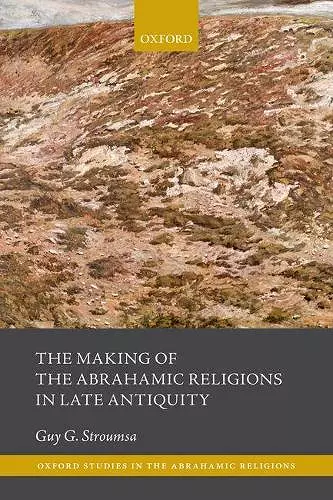The Making of the Abrahamic Religions in Late Antiquity
Format:Paperback
Publisher:Oxford University Press
Published:6th Jul '17
Currently unavailable, and unfortunately no date known when it will be back
This paperback is available in another edition too:
- Hardback£140.00(9780198738862)

This book presents how ancient Christianity must be understood from the viewpoint of the history of religions in late antiquity. The continuation of biblical prophecy runs like a thread from Jesus through Mani to Muhammad. And yet this thread, arguably the single most important characteristic of the Abrahamic movement, often remains outside the mainstream, hidden, as it were, since it generates heresy. The figures of the Gnostic, the Holy man, and the mystic are all sequels of the Israelite prophet. They reflect a mode of religiosity that is characterized by high intensity. It is centripetal and activist by nature and emphasizes sectarianism and polemics, esoteric knowledge, or gnosis and charisma. The other mode of religiosity, obviously much more common than the first one, is centrifugal and irenic. It favours an ecumenical attitude, contents itself with a widely shared faith, or pistis, and reflects, in Weberian parlance, the routinisation of the new religious movement. This is the mode of priests and bishops, rather than that of martyrs and holy men. These two main modes of religion, high versus low intensity, exist simultaneously, and cross the boundaries of religious communities. They offer a tool permitting us to follow the transformations of religion in late antiquity in general, and in ancient Christianity in particular, without becoming prisoners of the traditional categories of Patristic literature. Through the dialectical relationship between these two modes of religiosity, one can follow the complex transformations of ancient Christianity in its broad religious context.
Stroumsa provides a provocative and informative perspective on how not just Islam, but also Judaism and Christianity, were shaped in relation to each other in the crucible of late antiquity. * Franz Volker Greifenhagen, Reading Religion *
For those who need to be persuaded that Christianity, Judaism and Islam are helpfully grouped together and analysed as Abrahamic religions, Stroumsa provides a most compelling and subtle collection of evidence. This volume is highly recommended for those wanting to probe questions of method and content surrounding Islamic origins and the mutation of religiosity in Late Antiquity. * Damian Howard, Islam and Christian-Muslim Relations *
ISBN: 9780198786009
Dimensions: 235mm x 156mm x 13mm
Weight: 376g
238 pages